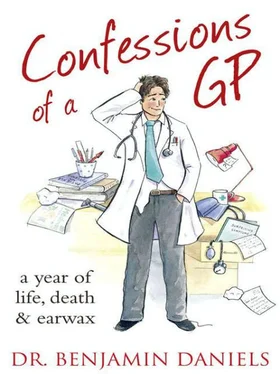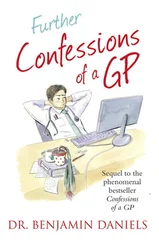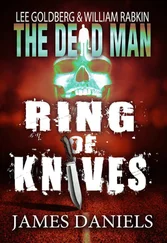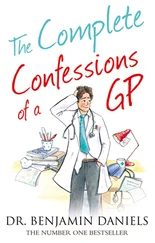‘You’ve gotta help me, Doctor. It’s the pain. I can barely walk. Those pills don’t work. None of it works!’
Jackie has been a patient at my surgery for years. She switches from doctor to doctor and has been on almost every painkiller known to modern medicine.
‘Are you going to see Jackie?’ my colleague asked me as I picked up her notes and headed out of the door of the surgery. ‘She’s got the worst case of SLS I’ve ever seen.’ SLS stands for ‘shit life syndrome’. Jackie has had a really shit life and this now manifests as chronic pain and fatigue. Jackie was abused as a child and young teenager by her stepdad. She then ran away from home and worked as a sex worker for a bit before she became pregnant at 17 by an abusive partner. Two more abusive partners and two more children later, she was alone at 21 with three children and an alcohol problem. Her children are now teenagers. Her son threatens her and regularly steals her benefit money and her daughter is a heroin user. Her eldest son is constantly in and out of prison. It’s not exactly The Waltons .
Jackie has pain all over her body. Her abdominal and back pains have been fairly constant over the last ten years or so and now she has general pains in her legs, arms, chest and hands. Jackie has had multiple scans and X-rays that have all been normal. She has seen neurologists and rheumatologists who have examined her thoroughly and run specialist blood tests and scans looking for rare disorders. They all drew blanks. She was finally diagnosed last year with fibromyalgia. The definition of fibromyalgia is ‘fatigue and widespread pain in the muscles’. It is a diagnosis of exclusion, which means that we diagnose it when we haven’t found anything else that could be causing the symptoms. Officially, there is no known cause for fibromyalgia, but unofficially the cause is ‘shit life syndrome’. This is my opinion and I’m sure lots of people will disagree with me. Perhaps in years to come they will find some odd hormone or virus that is responsible for this condition and find a cure, but in my experience it only ever occurs in people who have had tough and troubled lives and can’t articulate that pain verbally so it is instead expressed as physical pain.
I’m clearly not the first doctor to have recognised the likely association between Jackie’s physical symptoms and her emotional state. She has been tried on antidepressants and been referred to counsellors in the past, but she has always been reluctant to accept them. ‘I’m not depressed, Doctor. If you could just get rid of this pain then I’d be fine.’
Whenever I visit Jackie she wants me to try her on a new painkiller. Giving out a quick prescription is the easiest option for me as it is the quickest way that I can get out of the house. The problem is that I know that whatever I prescribe won’t work. She has tried every painkiller I can think of and now the only step up from here is morphine. I really don’t want to be responsible for making her a medicalised heroin addict; besides I know her kids will steal it and either take it themselves or sell it on the estate. Perhaps if I could just help her take some ownership of her condition and recognise the psychological element to it, maybe I could genuinely help her.
‘Jackie, why do you think you’re having all this pain?’
‘I dunno. You’re the doctor.’
‘It looks like you have had quite a hard time over the years.’
‘You can say that again.’
‘Some people find that going through large amounts of stress and upset can contribute to having physical pains and low energy.’
‘You think I’m making it up, don’t you. This pain is real, you know.’
‘I don’t think you’re making it up, Jackie. The pain is real but I just think that perhaps all the stress you’ve been through might be a big component to your symptoms.’
‘Nobody believes me. You doctors are all the same. You can’t leave me like this. I need something for the pain. I’m only 39 and I’ve not been out of the house for weeks. That can’t be normal, can it? You have to help me. I need something for the pain!’
‘I’m sorry, Jackie, but research has shown that fibromyalgia doesn’t really respond to painkillers. Some people find that gradually increasing activity levels and exercise can help. I could also refer you for some specialist talking treatment called cognitive behavioural therapy. There have been some studies to suggest that this can be useful.’
‘So you’re basically doing nothing for me.’
‘I’m not sure what more I can do, Jackie. I’m sorry.’
In my career as a doctor I’ve probably seen about 20 cases of chronic fatigue and fibromyalgia. In all the cases, after delving deeply, the one common factor that seems to link all the sufferers is ‘shit life syndrome’. Maybe in the future I’ll meet someone who is struck down with the condition without any predisposing psychological problems, but I doubt it. Doctors tend to deal badly with patients like Jackie. By simply organising more tests and giving more drugs, we are positively reinforcing the idea of the sufferer having a physical illness that is the responsibility of the medical profession to treat. The years of hospital out-patient appointments and specialist referrals encourage the idea that the person is sick. It is a role that they subconsciously fill and become dependent on. Being labelled as ‘ill’ is a distraction from the fairly miserable social and emotional problems that are the underlying cause. In some cases, being ‘ill’ is also a way of exerting some control on the people around them.
What would be more useful is if we could encourage patients like Jackie to take some responsibility and ownership of their condition and try to gently persuade them to start thinking about the connection between their physical and emotional health. This is easier said than done and my best efforts to do so clearly failed miserably.
The next time Jackie requests a doctor she specifically asks to see any doctor other than me. I know that this means I have failed, but I have to admit that it is a real relief to know that I won’t have to stand awkwardly in her lounge feeling helpless as I watch her suffer. One of my colleagues visits her instead and starts her on morphine.
It is 3 a.m. on a Sunday night and I’m working on call for the ‘out-of-hours’ doctors. I get a call through to do an emergency visit. Before I arrive, I have only minimal information about what to expect. All I know is that I’m visiting Mrs Briggs who is in her seventies and has breast cancer.
When I arrive, five or six family members greet me at the door. I’m ushered upstairs in hushed silence and shown into a dimly lit bedroom. In front of me lies a skeleton of a woman. Pale and semi-conscious, she is quite clearly dying. In my years as a doctor I’ve seen many people die. In hospital it is all quite clinical. It is easier to think of them as the ‘stroke’ in bed 3 or the ‘lung cancer’ in cubicle 2, rather than as a real person. In the patient’s own home it is less easy to protect yourself from the enormity of somebody’s death. Surrounded by belongings and pictures of them looking healthy and contented during happier times, the dying person feels overwhelmingly real.
The daughter explains to me that her mum’s wish is to die at home and the family is determined to keep her out of hospital or hospice. Up until now she had been managing fairly well, drinking small amounts and her pain was well controlled with tablets. Unfortunately, over the course of the evening she had deteriorated quite rapidly and she was now agitated and seemed to be in pain. She was writhing around the bed and crying out. With end stage cancer, it is very unpredictable as to how and when someone will actually die. With heart attacks, it is easy to understand. The heart ceases being supplied with blood and oxygen so it stops and that’s it. A slow-growing tumour that spreads and eats you away from the inside makes you weak and frail but it is difficult to know exactly how and when it will finally kill you. I couldn’t be sure exactly what it was that was going to end Mrs Briggs’s life, but there was no doubt in my mind that she was going to die tonight.
Читать дальше
Конец ознакомительного отрывка
Купить книгу











![Benjamin Franklin - Memoirs of Benjamin Franklin; Written by Himself. [Vol. 2 of 2]](/books/747975/benjamin-franklin-memoirs-of-benjamin-franklin-wr-thumb.webp)
![Benjamin Franklin - Memoirs of Benjamin Franklin; Written by Himself. [Vol. 1 of 2]](/books/748053/benjamin-franklin-memoirs-of-benjamin-franklin-wr-thumb.webp)